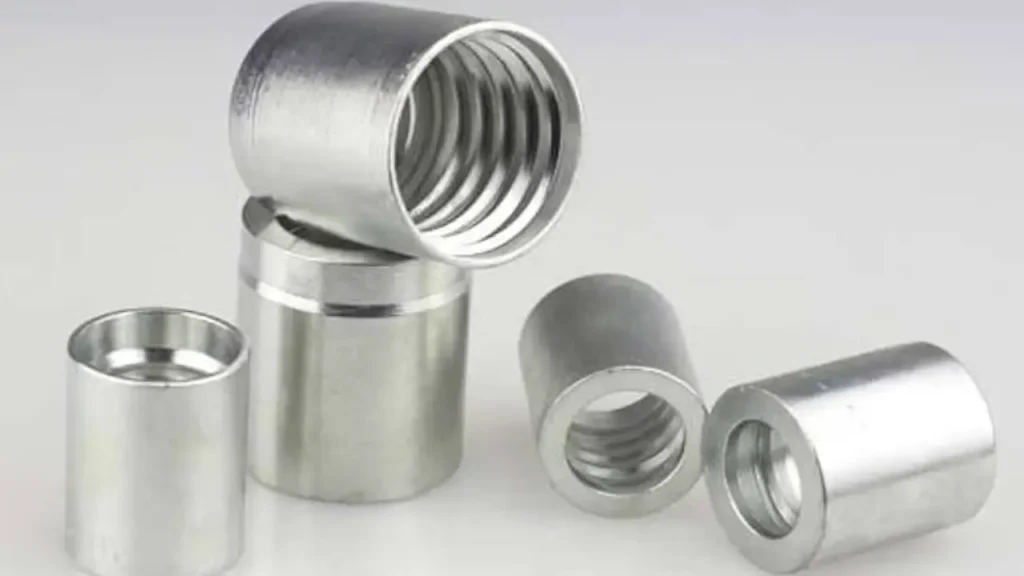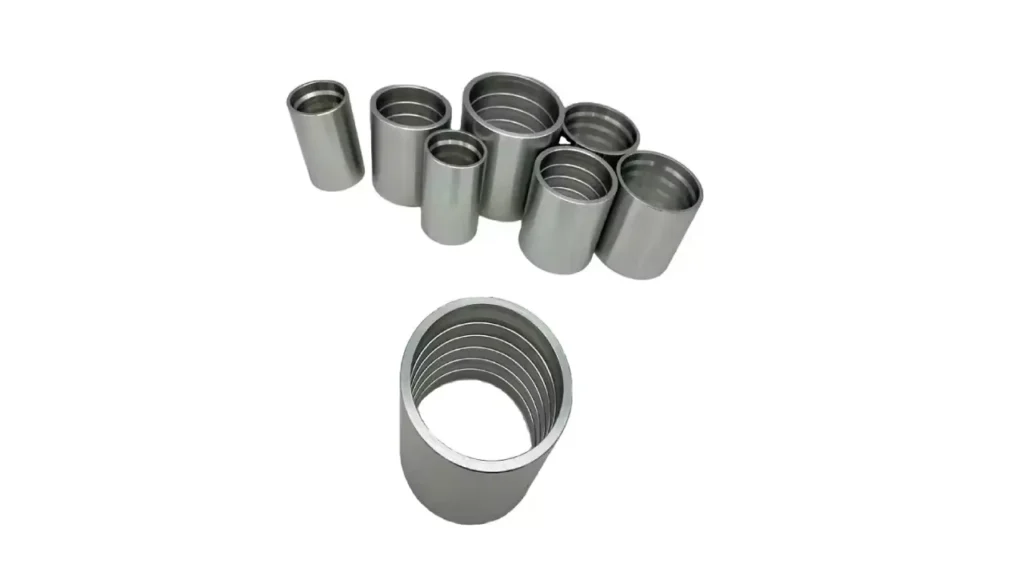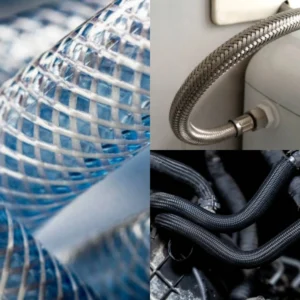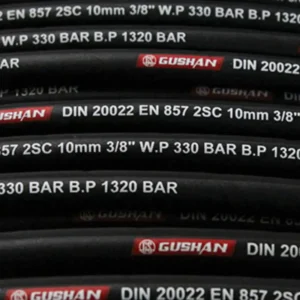Hydraulic hose ferrules are essential components that play a critical role in connecting hydraulic hoses to fittings. These small but crucial elements ensure a secure and leak-free connection, enabling the safe and efficient operation of hydraulic systems. This article will delve into the intricacies of hydraulic hose ferrules, exploring their function, types, and importance in maintaining system integrity.
By understanding the role and function of hydraulic hose ferrules, you can gain valuable insights into the critical aspects of hydraulic system assembly and maintenance.
What Is Hydraulic Hose Ferrule

A hydraulic hose ferrule is a crucial component used to create a secure and leak-free connection between a hydraulic hose and a fitting.
It is typically a metal sleeve that is crimped or swaged onto the end of the hose. The ferrule, in conjunction with the fitting, forms a strong and durable seal, preventing fluid leakage and ensuring the reliable operation of the hydraulic system.
What Is Hydraulic Hose Ferrule Made of?
Hydraulic hose ferrules are typically made of, and here are some wide materials to be used for hydraulic hose ferrule manufacturing:
- Brass: A common and widely used material due to its good strength, corrosion resistance, and machinability.
- Steel: Offers higher strength and durability compared to brass, making it suitable for high-pressure applications.
- Stainless Steel: Provides excellent corrosion resistance, making it ideal for applications involving aggressive chemicals or harsh environments.
The specific material chosen will depend on factors such as the application requirements, operating conditions, and the type of hydraulic fluid used.
What Is a Hydraulic Hose Ferrule Used for
A hydraulic hose ferrule is a crucial component used to secure hydraulic hose assemblies and ensure a leak-free connection between hoses and fittings. It provides mechanical strength, prevents hose slippage under high pressure, and maintains system integrity. Ferrules also protect the hose end from damage, extending the service life of hydraulic systems in demanding industrial applications.
Hydraulic hose ferrules serve several critical functions within a hydraulic system:
- Secure Hose to Fitting: Their primary function is to securely attach the hydraulic hose to its fitting. This creates a robust and leak-proof connection, preventing fluid leakage and ensuring the integrity of the system.
- Withstand High Pressure: Ferrules are designed to withstand the high pressures encountered in hydraulic systems. They provide a strong and reliable connection that can withstand the forces generated by the pressurized fluid.
- Prevent Hose Pull-Out: Ferrules help prevent the hose from pulling out of the fitting, even under extreme conditions such as vibration or shock loads.
- Improve System Reliability: By ensuring leak-free connections, ferrules contribute to the overall reliability and performance of the hydraulic system.
- Enhance Safety: Leak-free connections are crucial for safety. Leaks can pose hazards such as fire, injury, and environmental contamination. Ferrules play a vital role in mitigating these risks.
In essence, hydraulic hose ferrules are essential components that ensure the safe and reliable operation of hydraulic systems by providing strong, leak-free, and durable connections between hoses and fittings.
Hydraulic Hose Ferrule Types

What are the different types of hydraulic hose ferrule?
Hydraulic hose ferrules come in various types, each with its own design and application:
- Single Ferrule: This is the most common type, typically consisting of a single metal sleeve that is crimped onto the hose end.
- Double Ferrule: These utilize two ferrules, often with different diameters, to create a more secure and robust connection. The inner ferrule grips the hose, while the outer ferrule provides additional support and reinforcement.
- Skived Ferrules: These ferrules are used with hoses that have a skived end (a beveled cut at the end of the hose). The skive allows the ferrule to grip the hose more effectively, creating a stronger and more reliable connection.
- Reusable Ferrules: Some ferrules are designed to be reused, offering cost savings and reduced downtime in certain applications. However, careful inspection and proper maintenance are crucial to ensure the integrity of reusable ferrules.
The specific type of ferrule used will depend on factors such as the hose type, fitting type, operating pressure, and application requirements.
How to Choose the Right Hydraulic Hose Ferrule
Choosing the right hydraulic hose ferrule is crucial for a secure and leak-free connection.
Here’s a breakdown of key factors to consider:
Hose Compatibility:
- Hydraulic Hose Type: The ferrule must be compatible with the specific type of hydraulic hose (e.g., wire braid, spiral, thermoplastic) in terms of its size, material, and construction.
- Hose Size: The ferrule’s inner diameter must be an exact fit for the outer diameter of the hose to ensure a proper crimp and prevent leaks.
Fitting Compatibility:
- Fitting Type: The ferrule must be compatible with the specific type of fitting being used (e.g., straight, 90-degree elbow, swivel).
- Fitting Thread: The ferrule must be designed to work with the thread type of the fitting (e.g., NPT, BSPP).
Application Requirements:
- Pressure and Temperature: Consider the operating pressure and temperature range of the hydraulic system. Select a ferrule that can withstand these conditions without degradation or failure.
- Fluid Compatibility: Ensure the ferrule material is compatible with the hydraulic fluid used in the system to prevent corrosion or chemical degradation.
- Vibration and Shock: If the application involves significant vibration or shock loads, choose a ferrule that is designed to withstand these forces.
Manufacturer Recommendations:
Always consult the manufacturer‘s specifications for both the hose and the fittings.
Refer to their recommendations for compatible ferrule types and sizes.
Industry Standards:
Adhere to relevant industry standards and best practices for hydraulic hose assembly.
By carefully considering these factors, you can select the appropriate hydraulic hose ferrules, ensuring the safety, reliability, and long-term performance of your hydraulic system.
Conclusion
Hydraulic hose ferrules are essential components that ensure a secure and leak-free connection between hydraulic hoses and fittings. By understanding their function and proper installation techniques, you can significantly enhance the reliability and safety of your hydraulic systems.
Ready to upgrade your hydraulic systems with high-quality components?
Explore our extensive selection of premium hydraulic hoses and fittings. We offer a wide range of options to meet diverse application requirements. Contact us today for a quote and discover the difference quality components can make.




